
UEF Brain Research Unit 2.0
Funders
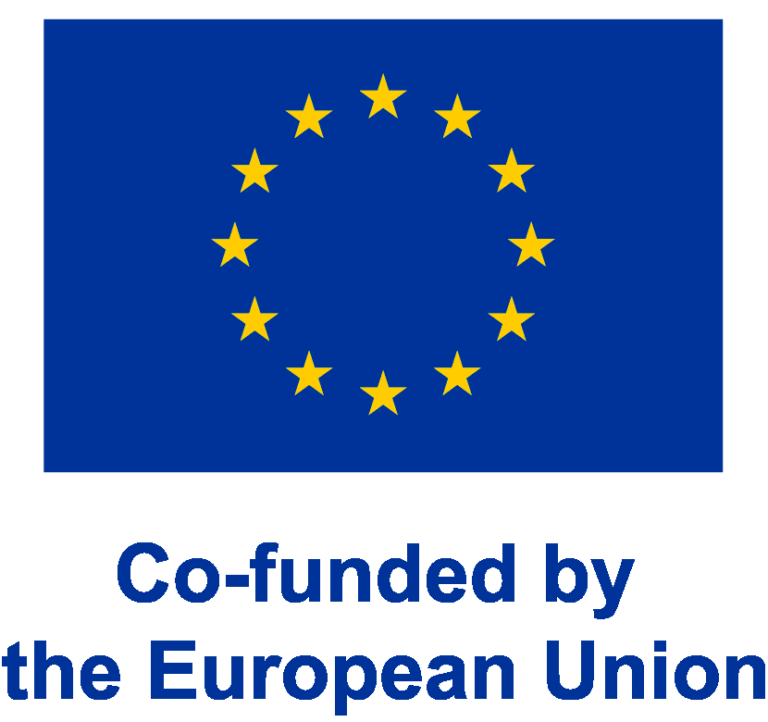
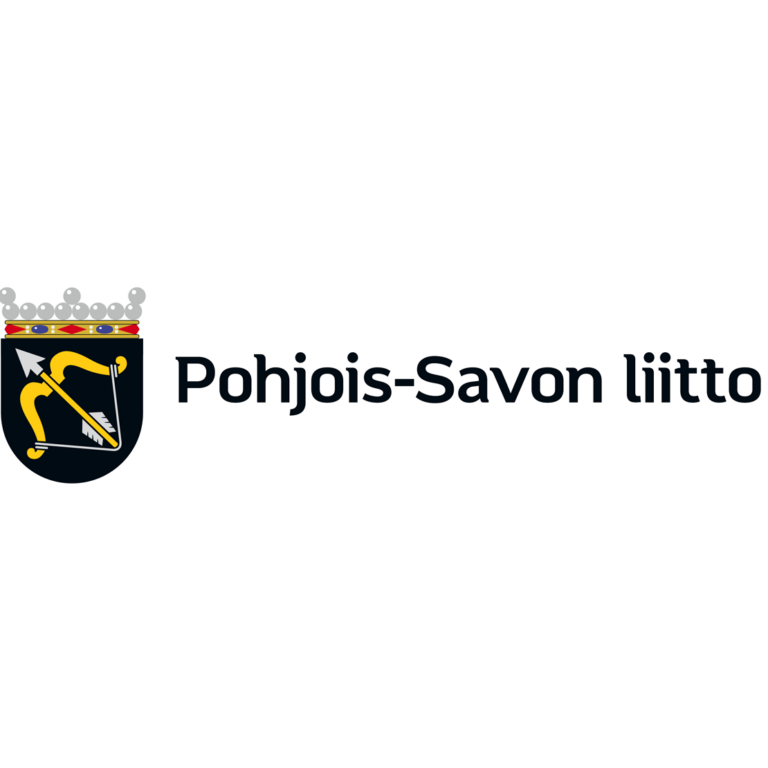
The project is funded by European Regional Development Fund (ERDF). The project is implemented by University of Eastern Finland.
The project is co-financed by Blueprint Genetics Oy, Roche Diagnostics Oy and Orion Oyj.
Leaders
The Brain Research Unit of the University of Eastern Finland (BRU) conducts high-quality clinical research as well as pharmaceutical research and collaboration with local, Finnish, and international research groups and the pharmaceutical industry. Specifically, the area of expertise in BRU includes biomarker studies, clinical trials and prevention studies of neurodegenerative diseases and cerebrovascular disorders. BRU also has the capability to investigate the genetic background, risk factors and basic mechanisms of brain diseases.
Importantly, BRU has 20 years of experience, and it operates national and international collaborative networks. BRU with its collaborative network provides a service to the international or domestic pharmaceutical industry in research from the basic research to clinics.
The aim of the UEF Brain Research Unit 2.0 ERDF project is to create a well-known, internationally attractive, and scalable operating model and brand in collaboration with UEF, KUH (Kuopio University Hospital) and companies. This strengthens the local Kuopio Health ecosystem and utilizes the extensive national and international network of the Neurocenter Finland and other stakeholders.
The key operating processes will be strengthen based on the needs identified from business field by identifying bottlenecks, which are limiting cooperation as well as opportunities for new cooperation openings and partnering. Solution options are sought in ecosystem cooperation and tested by business-driven co-development (three piloting cases) and further development of internal processes and cooperation (three work packages), as well as identifying new commercialization potential in both organizational and operational environment level.
UEF Brain Research Unit 2.0 is a new and scalable approach to multifunctional cooperation. The ERDF project creates, by further developing existing and new activities, nationally and internationally competitive forms of cooperation and structures that better serve the global the needs of pharmaceutical companies, equipment manufacturers, health technology operators and high-quality academic research. Furthermore, the project creates a plan to further develop activities, to meet the new updating needs created by the societal framework of clinical research and digitalization.
News
-
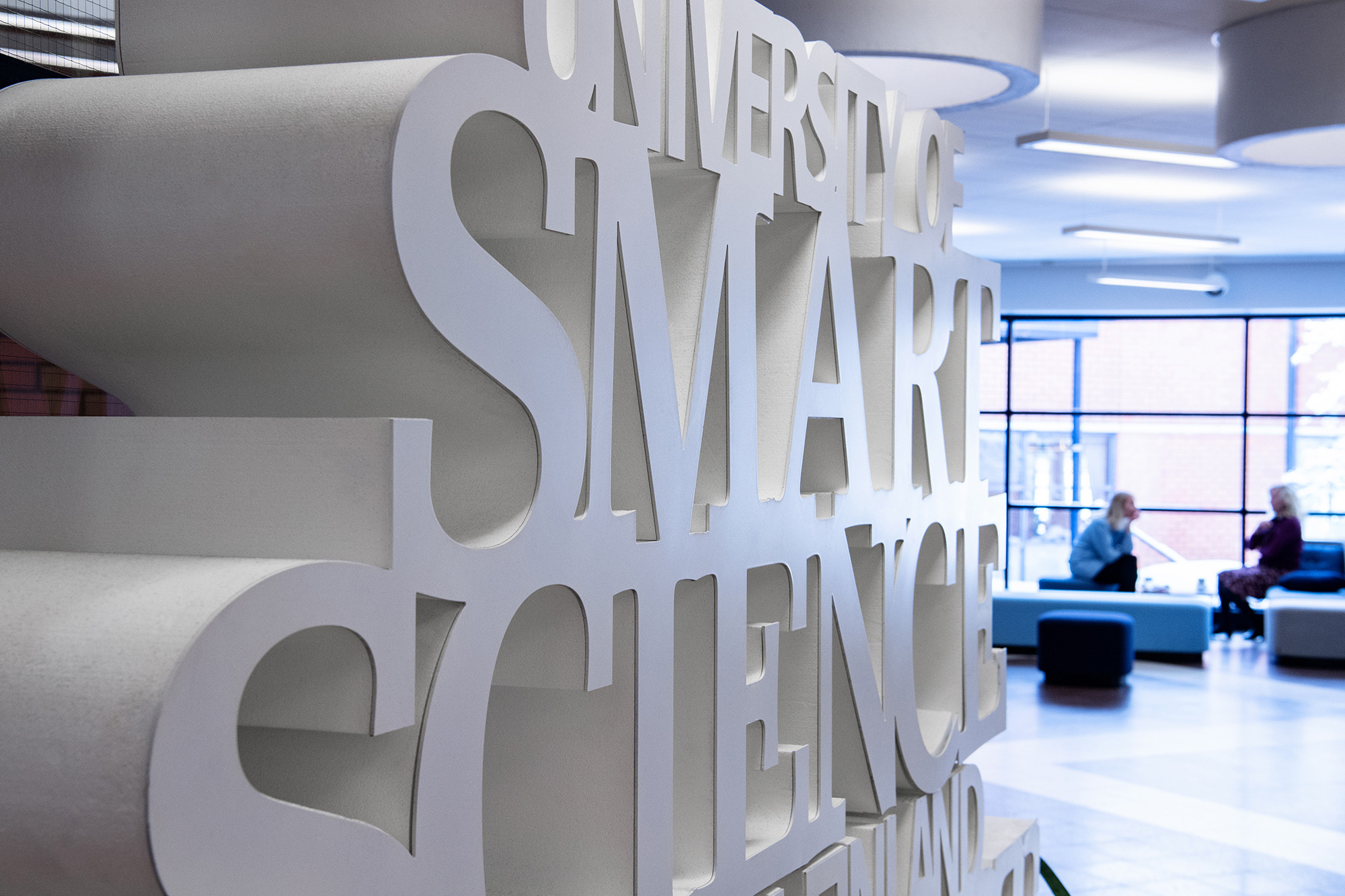 New service concept in brain research sets an example for others to follow
New service concept in brain research sets an example for others to followNew service concept in brain research sets an example for others to follow
The Brain Research Unit's new service concept has improved the process of identifying individuals in biobanks and recontacting them for studies,… -
 First blood test for Alzheimer’s disease launched at the UEF Biomarker Laboratory
First blood test for Alzheimer’s disease launched at the UEF Biomarker LaboratoryFirst blood test for Alzheimer’s disease launched at the UEF Biomarker Laboratory
The Biomarker Laboratory at the University of Eastern Finland Brain Research Unit is launching diagnostics for a biomarker of Alzheimer’s disease,…
UEF Brain Research Unit 2.0 ERDF
The project aims to create a well-known and scalable operating model for brain health clinical trials in multifunctional collaboration with researchers and experts from the University of Eastern Finland, Kuopio University Hospital / Wellbeing Services County of North Savo and different companies.
Academic and commissioned studies (clinical trials for the development of drugs or medical devices) are taken into consideration when building the operating model.
The purpose is to enable other fields of medicine to use the operating model in their respective cooperation projects as well. The overall goal of the project is to promote local business-oriented innovation in clinical research.
The project is closely related to the activities of UEF’s Brain Research Unit (https://uefconnect.uef.fi/en/group/brain-research-unit-bru-clinical-trial-unit/), Neuroscience Research Community (Neuro-RC; https://www.uef.fi/en/research-community/neuroscience-neuro) and Kuopio Brain & Mind (https://kuopio.neurocenterfinland.fi/en/).
See our flyer: UEF_BRU_flyer_a4_eng
Work packages
-
This WP aims to conceptualise collaboration-based (UEF – KUH/ Wellbeing Services County of North Savo – companies) scalable services linked to clinical trials at BRU and to identify international competitiveness factors and new opportunities for operations.
Measures:
- Clarifying the operating model and service offering and identifying and strengthening the role of operators, e.g., development of the UEF-KUH/ Wellbeing Services County collaboration and preparation of process descriptions incl. contracts and general administration
- Identifying current and new competitiveness factors internationally and preparing a related development plan (e.g., digital clinical trials, distributed clinical trials and remote monitoring)
- Updating and expanding the service concept to meet identified business and science-oriented needs, e.g., development of patient recruitment and cooperation with patient organisations.
Collaboration: UEF – internal actors, companies, and stakeholders widely through the new forum for co-development and the Kuopio Health ecosystem.
Contact persons: Jenni Niinimäki, Mari Tikkanen, Eino Solje, Reetta Kälviäinen and Maria Pikkarainen (see People for contact information)
-
WP2 aims to further develop the cooperation related to imaging data between the UEF and the KUH/Wellbeing Services County of North Savo.
Measures:
- Mapping of the current state and identification of development needs to transfer diverse image data to UEF’s efficient computing environment (UEF Bioinformatics center), e.g.,
- Open-source solutions for image data analysis integrated into the UEF environment
- Intensifying collaboration between UEF – KUH/ Wellbeing Services County (e.g., KUH Imaging Center)
- Developing collaboration related to usage of health data as a part of the BRU service concept.
Collaboration: Pilot 3, UEF – internal actors, KUH/ Wellbeing Services County of North Savo (KUH Research Services, KUH Imaging Center, KUH data lake), Biobank of Eastern Finland, Kuopio Health
Contact persons: Jussi Tohka and Maria Pikkarainen (see People for contact information)
- Mapping of the current state and identification of development needs to transfer diverse image data to UEF’s efficient computing environment (UEF Bioinformatics center), e.g.,
-
WP 3 aims to build the framework and concept of Patient & Public Involvement (PPI) as a part of BRU’s services and to identify further exploitation opportunities for PPI in both academic and commissioned research activities.
Measures:
- Preparing a plan for the PPI operating model incl. investigating commercialisation opportunities, e.g., situation surveys by means of interviews (e.g., patient organisations) and surveys aimed at companies
- Describing the legal clinic operating model, preliminary experiences from piloting the model and a plan for implementing the concept as part of the PPI concept in the operating environment of the BRU
Collaboration: UEF Neuro Research Community (Neuro-RC), companies, patient organisations, and Kuopio Brain & Mind
Contact persons: Piritta Parkkari, Päivi Eriksson, Anna Mäki-Petäjä-Leinonen and Maria Pikkarainen (see People for contact information)
-
WP4 aims to create an operating model to identify individuals with underlying functional genetic variants associated with neurodegenerative diseases from biobanks for commissioned studies and academic studies.
Measures:
- Methodological piloting of genetic testing – evaluating the identification and accuracy of known gene alterations associated with brain diseases
- Intensifying collaboration between UEF and the Biobank of Eastern Finland and further developing the re-calling process
- Utilising genetic information (genotype, phenotype) of biobank data for the development of personalised treatments for brain diseases
- Creating the genetic operating model and procedures for brain diseases in the BRU and testing them
Collaboration: Biobank of Eastern Finland, UEF Genome Center, FinnGen project, KUH/ Wellbeing Services County of North Savo and pilot company Blueprint Genetics Oy
Contact persons: Seppo Helisalmi, Mikko Hiltunen and Maria Pikkarainen (see People for contact information)
-
WP5 aims to further investigate the added value of biomarker analytics and to identify new competitiveness factors.
Measures:
- Developing need-based biomarker analyses and validating existing commercial tests, incl. new biomarker candidates emerging from research.
- Developing and validating the RT-QuIC method
- Preparing a business development roadmap and further developing the service process for the Biomarker laboratory
Collaboration: pilot companies Roche Diagnostics Oy and Orion Oyj
Contact persons: Sari Kärkkäinen, Sanna-Kaisa Herukka and Maria Pikkarainen (see People for contact information)
See also:
Brain Biomarker Analysis: https://sites.uef.fi/aivobiomarkkeritutkimukset/?lang=en; https://uefconnect.uef.fi/en/group/biomarkers-for-neurological-disorders/
-
WP6 aims to improve the UEF-KUH’s/ Wellbeing Services County of North Savo’s knowhow and resources to support and further develop the cooperation processes related to commercialisation, case neuroimaging cooperation in academic and commission studies.
Measures:
- Describing the expertise and key infrastructure needed for imaging studies tailored to customer needs to support communication and contracts.
- Deepening the cooperation between BRU and KUH imaging services.
- Developing procedures and processes for imaging studies related to clinical academic and commissioned studies to be smooth and repeatable both from an internal point of view and from a customer company point of view.
Collaboration: KUH/ Wellbeing Services County of North Savo (KUH Research Services, KUH Imaging Centre) and the pilot company Orion Oyj
Contact persons: Jenni Niinimäki, Mari Tikkanen, Eino Solje, Reetta Kälviäinen, Jussi Tohka and Maria Pikkarainen (see People for contact information)
-
A new thematic forum for co-development will be created where project team members, target groups and stakeholders evaluate and develop the cooperation model together. The forum will be integrated into the operations of the Kuopio Health ecosystem.
The forum consists of several thematic events that involve target/stakeholder groups in joint development (workshops, discussions, seminars or working in working groups).
The forum offers numerous meeting opportunities for identifying the R&D development needs of new services and products, finding new business opportunities, and creating new cooperation openings and partnerships.
Collaboration: UEF – internal actors (incl. Development Services, Clinical Research Centre, BRU, BRU Biomarker laboratory, Neuro-RC), Kuopio Brain & Mind, Neurocenter Finland, KUH / Wellbeing Services County of North Savo, Kuopio Health, companies, VTT, the city of Kuopio
-
The main target group consists of the actors of the Kuopio Health ecosystem, especially startups, micro enterprises and SMEs operating in the field of health technology and health data in the Kuopio area and the Northern Savo region. The measures are aimed specifically at the experts and company management carrying out RDI work in the health sector.
The main stakeholders are (brain) health researchers, clinical experts and health professionals, special experts conducting applied research and product development, as well as other personnel and management responsible for operational development at UEF and at the Kuopio University Hospital (KUH) / Wellbeing Services County of North Savo.
In addition, many other experts and personnel of ongoing development projects belong to the stakeholder group (including personnel from the KUH, Biobank of Eastern Finland, UEF Genome Center, Kuopio Health, Neurocenter Finland, Savonia UAS, VTT, patient organisations, the city of Kuopio, and Kuopio Region Chamber of Commerce).
- Kuopio Health (https://kuopiohealth.fi/en/front-page/)
- Neuro-RC (https://www.uef.fi/en/research-community/neuroscience-neuro)
- UEF Clinical Research Centre (https://sites.uef.fi/crc/)
- UEF Institute of Clinical Medicine (https://www.uef.fi/en/unit/institute-of-clinical-medicine)
- Genome Center of Eastern Finland (https://uefconnect.uef.fi/en/group/genome-center-of-eastern-finland/)
- Kuopio Brain & Mind (https://kuopio.neurocenterfinland.fi/en/)
- Kansallinen Neurokeskus (https://neurocenterfinland.fi/en/)
- Pohjois-Savon hyvinvointialue (https://pshyvinvointialue.fi/
- Biobank of Eastern Finland (https://ita-suomenbiopankki.fi/en/)
- Savonia UAS (https://www.savonia.fi/en/homepage/)
- ISLAB (https://www.islab.fi/en/we-are-islab-a-local-and-safe-laboratory-centre/)
- VTT (Health data analytics, https://cris.vtt.fi/en/organisations/ba6308-health-data-analytics)
- City of Kuopio (https://www.kuopio.fi/en/city-of-kuopio/strategy-and-development/development/)
- Pohjois-Savon Muisti ry (https://www.psmuisti.fi/)
- Finnish Movement Disorders Association (https://www.liikehairio.fi/en)
- Finnish Epilepsy Association (https://www.epilepsia.fi/en/home/)
- Finnish Brain Association (https://www.aivoliitto.fi/english/)
- Finnish Neuro Society (https://neuroliitto.fi/neuroliitto/briefly-in-english/)
-
Upcoming events
From Genomics to Practice Part II: Personalised Healthcare from the Perspective of Genomic Information
Time: Friday 4.10.2024 at 10-15:30
Target group: Professionals working in pharmaceutical, health technology and other healthcare companies, research organisations or in wellbeing service counties. Well suited for those working in product development and research, clinical trials and education. The event, especially the workshop, is intended for companies from start-ups and health tech to pharma.
Location: University of Eastern Finland, Tietoteknia building, seminar class 1038 (Savilahdentie 6, 70620 Kuopio) or Teams.
Join us for a free training session where experts in the field will share knowledge and practical examples of how genome data can be used. In the morning seminar, you will learn how genomic data can provide an opportunity for personalised medicine applications, how genetic testing for brain diseases is being developed, and the potential of the FinnGen project and the Finnish biobanking system for patient selection in clinical trials.
Afternoon workshop provides you an inspiring opportunity to innovate the most efficient way to use genetic data in your company based on the introductory speeches heard in the morning session.
Make the most of the training day and expand your network by getting to know other participants during breaks and the workshop.
The training session and materials are in English.
Sign up for the training day by 23.9.2024!
A detailed program of the day & Registration
The training has been organised in cooperation with the ReguVa project, the UEF Brain Research Unit 2.0 ERDF project (UEF ATY 2.0) and the Genome Center of Eastern Finland.
SAVE THE DATE
Workshop on real-world brain imaging data: Harnessing MRI, PET, and CT for Brain Research
Event Details
Date and Time: October 23, 2024, from 1:00 PM to 4:00 PM
Location: The event is organized either online or as a hybrid. This will be detailed later.
Participation: Free
Registration: Registration for the event opens in August.
Real-world data (RWD) refers to data derived from various non-experimental or observational sources that reflect routine clinical practice. Given the limitations in the number of participants in controlled trials or research-based cohorts, it is becoming increasingly interesting to tap into RWD as an alternative for truly big data analytics. In this workshop, we discuss possibilities to use real-world brain imaging data (mainly referring to magnetic resonance imaging, emission tomography, and computed tomography) for brain research. Because imaging is expensive and many brain imaging examinations are performed in clinical practice, there exists a large, valuable resource that is underused. Real world imaging data does not obviously come without challenges: 1) Data is not acquired utilizing a standardized protocol across sites and participants, and therefore may not require specialized methodology to use it. 2) Obtaining a permission to use data, whether based on informed consent, secondary use law, or via biobank, might not be straight-forward. 3) The data might be big in scale and requires specialized computing solution before it can be used. In this workshop, we gather several experts to discuss and share best practices in using real-world imaging data and answer what, why, when, and how questions around the topic.
The workshop is intended for researchers, experts in well-being areas, companies, and anyone interested in the topic.
UEF Brain Research Unit 2.0 ERDF project organizes this event. Jussi Tohka, Professor of biomedical image analysis from the A.I. Virtanen Institute, UEF moderates the event.
Need more information? Contact:
Jussi Tohka, [email protected]
Past events
Patient and public involvement (PPI) – workshop for UEF researchers, 17.4.2024
In this workshop:
- you will hear Reetta Kälviäinen’s presentation on what patient and public involvement (PPI) means, why it is important, and how it can be taken into account in different ways at various stages of research.
- you will have the opportunity to share your own experiences and views on PPI in research projects.
- we will brainstorm together how to implement PPI in research projects.
UEF’s Brain Research Unit wants to help researchers with PPI. By participating in this workshop, you will influence the PPI model developed by the unit.
The workshop is aimed at researchers who are interested in learning more about PPI.
The workshop is facilitated by innovation expert Piritta Parkkari ([email protected]).
****
Workshop on Biomarkers for Epilepsies and Neurodegenerative Diseases
Event Details
Date and Time: March 13, 2024, from 10:00 AM to 1:00 PM
Location: Kuopio City Theatre, Maria-stage, Niiralankatu 2, 70600 Kuopio
Participation: Free
Registration Deadline: March 1st, 2024
To register for the event, please click HERE.
During this workshop we will discuss shared and distinctive characteristics of changes in neuronal markers in various neurological disorders and consider the emerging opportunities and challenges for their future research and diagnostic use. Lessons learned from other therapeutic areas as well as diversity of perspectives are expected to result in the generation of fresh ideas and innovative solutions. Our guest speaker, professor Johan Zelano, introduces us to the topic with his remote talk on “Blood based biomarkers in epilepsies and neurodegenerative diseases“. Johan Zelano is a professor of neurology at Sahlgrenska academy and a consultant neurologist at Sahlgrenska university hospital, Gothenburg, Sweden. https://www.gu.se/en/research/johan-zelano
The event is intended for companies from start-ups and health tech to pharma, investors, researchers, and clinicians. The purpose of the event is to stimulate creativity and promote future collaboration.
UEF Brain Research Unit 2.0 ERDF project organizes this group discussion as a free pre-symposium event in connection with Kuopio Epilepsy Symposium 2024. Sanna-Kaisa Herukka, PhD, leader of the UEF Biomarker laboratory, hosts and moderates the event.
Come to share your ideas and perspectives with others. Register for the group discussion event!
Need more information? Contact:
Maria Pikkarainen, Project Manager, UEF ATY 2.0 ERDF project
[email protected]***
NEUROCENTER FINLAND ANNUAL EVENT 2023 – Translational Research in Neuroscience – From cellular signaling to new treatments, 29-30 November 2023
This event brings together various actors involved in neurosciences: researchers, clinicians, companies from start-ups and health tech to pharma, investors, patient organisations and stakeholders at large. The purpose of the event is to increase interdisciplinary and translational dialogue and facilitate future collaborations.
The event kicks off on Wednesday, 29th of November with a networking evening in King’s Crown.
Thursday, 30th of November offers a full day program with various hot topics related to translational neuroscience research, development and innovations, and time for networking and dialogue during the breaks.
The UEF Brain Research Unit 2.0 project also participates in this event. Come and meet us at our stand!
Please, find the detailed program and registration link from the event website.
Participation: For free! Sign up before November 23rd 2023!
-
Patient and public involvement (PPI) – workshop for UEF researchers, 17.4.2024
The UEF Brain Research Unit is developing a new operation model for helping researchers and companies with Patient and Public Involvement (PPI). Two weeks ago, we organized a workshop on PPI for UEF’s health researchers as part of the UEF BRU 2.0 ERDF project. The workshop aimed to enhance understanding of what PPI is in health research. The purpose was also to find out what kind of support researchers need to implement PPI in their research projects and whether Brain Research Unit could offer such support in the future.
Piritta Parkkari, an Innovation Specialist in the UEF BRU 2.0 project, facilitated the workshop. We learned from the workshop warm-up questions that participants find PPI highly important, but many don’t yet have much experience in how to do it in practice.
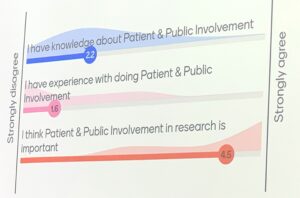
Involvement improves the quality of research
Professor Reetta Kälviäinen from the Institute of Clinical Medicine, Neurology (UEF) introduced the topic of the workshop by telling what PPI is and why it is important. She illustrated the point by giving examples from working with epilepsy patients. It is becoming increasingly important to make sure that members of the public or patients have an active role in health research.
– PPI is about doing research with or by patients and the public, not to, about or for them. Involvement is about working collaboratively with patients and the public and sharing decision-making. Research conducted with PPI improves research and achieves better outcomes for patients.
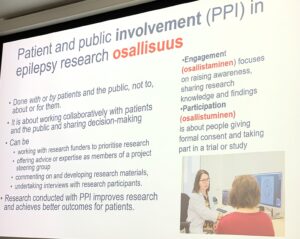
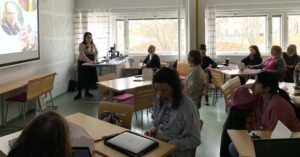
Adjunct Professor Jukka Jolkkonen from the Institute of Biomedicine (UEF) continued the workshop by giving examples of implementing PPI in basic research in some EU projects. Including PPI in basic research can be challenging.
– Basic researchers need support measures and guidance at academia so that they can properly include PPI measures in their projects.

Involvement Matrix – a tool for planning PPI activities
Parkkari introduced a tool called the Involvement Matrix. It was used to brainstorm how patients, caretakers, family members, patient organisations, or the public could be involved in different roles at different stages of research. The activities researchers brought ranged from patients being informed about a project to contributing to formulating research questions, and even to patients acting as project members and educating researchers about the condition they are living with.
- We used this tool to get researchers to start imagining what PPI could look like. The Matrix can also be used a tool for researchers and patients to together plan activities and discuss each parties’ interests and needs, summarises Parkkari.


More training and support are needed
The workshop showed that there is a growing interest in Patient and Public Involvement amongst researchers. However, more training and support is needed for researchers to understand how PPI can be done in practice.
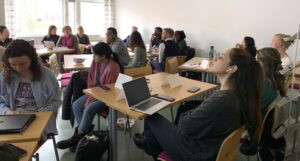
The workshop yielded some good ideas about how the Brain Research Unit can assist researchers in enhancing involvement in their research projects.
****
Insights from the Workshop on Biomarkers for Epilepsies and Neurodegenerative Diseases held on 13th March in Kuopio
Workshop on Biomarkers for Epilepsies and Neurodegenerative Diseases was held as a pre-symposium event alongside the 10th Kuopio Epilepsy Symposium 2024 on March 13th in Kuopio.
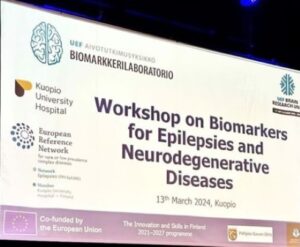
Biomarker workshop 13.3.2024 The workshop brought together over 50 researchers, clinicians, experts, and industry representatives with the aim of driving collaborative research on biomarkers. Key discussions revolved around the shared and distinctive characteristics of neuronal marker changes across neurological disorders, highlighting emerging opportunities and challenges for future research and diagnostic use.
Johan Zelano, a professor of neurology at Sahlgrenska academy and a consultant neurologist at Sahlgrenska university hospital, Gothenburg, Sweden gave an introduction talk emphasizing the role of Tau protein in both epilepsy and neurodegenerative diseases and underlining the clinical need for biomarkers in epileptic seizures and status epilepticus. Dr. Sanna-Kaisa Herukka, leader of the UEF Brain Research Unit’s Biomarker Laboratory, gave insights on the Biomarker Laboratory’s capabilities, emphasizing biomarkers like BAm42, Tau, and FosTau in Alzheimer’s disease and other neurodegenerative disorders and the diagnostic potential of serum neurofilament analysis.
Other highlights included insights from Dr. Susanne Bäck, Senior Manager, Charles River Discovery Research Services, Kuopio, on importance of biomarker discovery in preclinical research. Utilization of biomarkers already in preclinical phase increases the success rate of clinical phase. Integration of biomarkers in preclinical drug discovery increases the probability of success in clinical trials. Dr. Joana Amorim Freire, Associate Scientific Communications Manager, Roche Diagnostics, presented the Neuro Toolkit. Dr. Valtteri Julkunen, UEF, presented the FinnGen and the TWINGEN studies and emphasized the benefits of selective patient recruitment in clinical biobank-based studies. From a future perspective the next step is building framework for imaging biomarkers by obtaining neuroimaging data from biobanks.
In addition to the speeches, the workshop consisted of audience-participating questions and a panel discussion. The panel discussion underscored the need for multidisciplinary collaboration, emphasizing the workshop’s key insight: biomarker similarities exist across neurological diseases, necessitating collective efforts. The panel included Valtteri Julkunen, professor Reetta Kälviäinen, UEF, professor Mikko Hiltunen, UEF, and Susanne Bäck.
Participants found the event valuable, expressing a desire for more such gatherings to foster collaboration, share visions, and tackle complex issues together. These events serve as platforms for diverse perspectives, fresh ideas, and innovative solutions, facilitating collaborations between universities, hospitals, and companies.
As part of our mission, the UEF Brain Research Unit 2.0 project will continue organizing thematic workshops to foster multidisciplinary collaborations and research partnerships. Upcoming events will be announced on the project’s website.
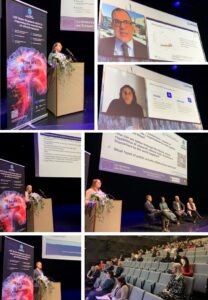
Biomarker workshop gathered over 50 participants on 13th March 2024
Keywords
Leaders
Professors
-

Reetta Kälviäinen
ProfessorInstitute of Clinical Medicine, School of Medicine, Faculty of Health Sciences -

Päivi Eriksson
ProfessorBusiness School, Faculty of Social Sciences and Business Studies
Senior Researchers
-

Eino Solje
Research DirectorInstitute of Clinical Medicine, School of Medicine, Faculty of Health Sciences -
Sanna-Kaisa Herukka
Research DirectorInstitute of Clinical Medicine, School of Medicine, Faculty of Health Sciences -

Jussi Tohka
ProfessorA.I. Virtanen Institute for Molecular Sciences, Faculty of Health Sciences -

Anna Mäki-Petäjä-Leinonen
ProfessorLaw School, Faculty of Social Sciences and Business Studies
Contact person
Team members
-
Mari Tikkanen
Project ControllerFinancial Services, University Services -

Seppo Helisalmi
Staff ScientistInstitute of Clinical Medicine, School of Medicine, Faculty of Health Sciences -

Sari Kärkkäinen
Laboratory CoordinatorInstitute of Clinical Medicine, School of Medicine, Faculty of Health Sciences -

Piritta Parkkari
Project ResearcherBusiness School, Faculty of Social Sciences and Business Studies -

Jenni Niinimäki
Visiting ResearcherInstitute of Clinical Medicine, School of Medicine, Faculty of Health Sciences


